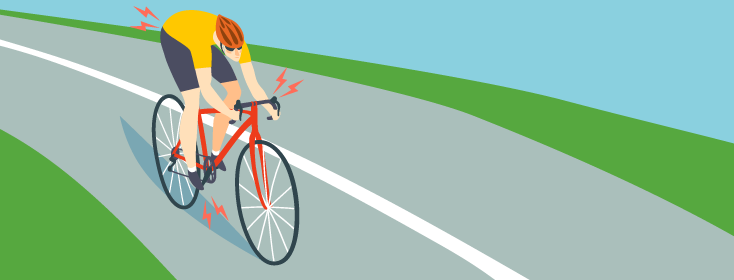Aches and Aches
There are aches, and then there are pains. The frequency of both have proliferated in my life since being diagnosed with rheumatoid arthritis. As a young athlete in extreme sports, aches and pains were endured with a feeling of satisfaction in the pursuit of my goals, and scars from injury were the equivalent of a badge of honor. This was the 90's when No Fear T-Shirts gloated slogans of risk taking, grunge and punk music defined a generation of angst driven teenagers, "freestyle" individualism began to overtake organized sports teams, and the culture now marketed worldwide by RedBull and GoPro found its footing.
The omnipresent RA pain
Excellence in high-risk sport required pushing one's limits and injuries were part of the game. Not so with RA. I try to bear the stinging pain of swollen feet with dignity, but the pain is neither a badge of honor nor price of success. It simply is.
Muscle aches during the first ski days of the season when the body is not adapted to the demands but the mind is filled with adrenaline induced determination and joy, were expected and commonplace. Likewise, soreness from overtraining, pushing too hard, or beginning a weight-raining program in the off-season of the bike-racing calendar was customary. In athletics, certain time periods of aches or muscle soreness are predictable and even planned for. But aches with RA are an entirely different phenomenon.
When achy, sore muscles are not due to a new activity but an everpresent phenomenon
Achy muscles, a feeling of malaise, and the occasional waking up to a sore but not swollen or painful body, seem to occur with an almost randomness, not precipitated by discernible events. This is categorically different than the pain I experience during flares when visible swelling accompanies the stiffness in the joints of my hands, wrists, feet and shoulders. That type of pain is acute and abrupt. In contrast, the aches appear slowly and stay a while, uninvited guests, to the party.
Due to a vague soreness in my legs and lower back, I have been walking slowly this week. "Perhaps it is the increase in hours of exercise this last month," I thought. "Or the increased stress of the Holidays." No, I am nearly certain that the muscle aches are related to RA or treatment. They have been coming and going since my first symptoms. The difference in body feel pre and post diagnosis is substantial.
Aches and soreness: Early symptoms of RA
A two-year prospective study of 66 RA patients in Sweden states that "Impairment of the joint and muscle function is often observed at an early stage. The effect on muscle strength occurs during the early phases of disease. The dynamic muscle strength of the lower extremities was reduced to 46% compared with healthy subjects in one study of patients with early RA. An impaired muscle function might be explained by pain, reflex inhibition, muscle atrophy, limited joint motion, myopathy, medication and psychological factors."1 RA can affect range of motion, muscle strength, and dynamic movement. That the muscles ache seems a part of this.
According to our 2013 RA in America survey at rheumatoidarthritis.net, both back pain and general weakness were in the top ten most common symptoms. "Inflammation of the connective tissue occurs commonly in people with RA. Nearly half of those who participated reported general weakness as one of their most frequent RA symptoms," and "Over half included back pain as one of the symptoms of RA that they experience most frequently."2
If you are experiencing vague aches in muscles and soft tissue, you are not alone. It is a commonality shared by many with this pernicious disease that is far more vicious than the word arthritis denotes.

Join the conversation